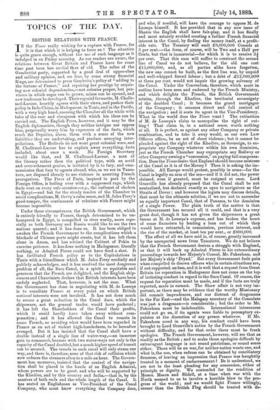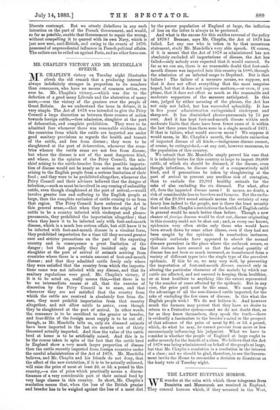TOPICS OF THE DAY. •
BRITISH RELATIONS WITH FRANCE.
IS the Times really wishing for a rupture with France, for it is that which it is helping to force on ? The situation is quite grave enough, without the use of such language as it indulged in on Friday morning. As our readers are aware, the relations between Great Britain and France have for some time past been less cordial than of old. The relics of the Gambettist party, supported by a good deal of upper-class and military opinion, and, we fear, by some strong financial Rings, are determined to press Gambetta's policy of " adding to the fortune of France," and repairing her prestige by acquir- ing new colonial dependencies,—not colonies proper, but pro- vinces in which sugar can be grown, mines can be opened, and new trades can be developed. Their especial favourite, M. Challe- mel-Lacour, heartily agrees with their views, and pushes their policy in Indo-China, in Madagascar, in Tunis, and in the Pacific, with a very high hand, amusing the Chamber all the while with tales of the ease and cheapness with which his ideas can be carried out. The English Press, however, and it may be the English diplomatists, though they neither intrigue nor oppose him, perpetually worry him by exposures of the facts, which reach the Deputies, alarm them with a sense of the new liabilities they are undertaking, and produce annoying inter- pellations. The Radicals do not want great colonial wars, and M. Challemel-Lacour has to explain away everything, facts
included, about once a week. No Foreign Secretary would like that, and M. Challemel-Lacour, a man of the literary rather than the political type, with an acrid and over-vehement genius, is irritated by it to fury, and com- municates that fury to agents abroad, who, as we see in Tama- tare, are disposed already to use violence in asserting French prerogatives. The Press of Paris, inspired in part by the Foreign Office, is boiling over with a suppressed rage, which finds vent on every safe occasion—e.g., the outburst of cholera in Egypt—and but for the steady resolve of the Chamber to avoid complications, M. Grt;vy's calm sense, and M. Jules Ferry's good-temper, the continuance of relations with France might become impossible.
Under these circumstances, the British Government, which is entirely friendly to France, though determined to be un- hampered in Egypt, is compelled to steer warily, more espe- cially as both Germany and Russia would like to see the two nations quarrel ; and it has done so. It has been obliged to awaken the French Government to the complications which a blockade of Chinese ports might create, but it has left them alone in Anam, and has advised the Cabinet of Pekin to exercise patience. It has done nothing in Madagascar, literally nothing, or Admiral Pierre could not have fired a shot. It has facilitated French policy as to the Capitulations in Tunis with a friendliness which oL Jules Ferry cordially and publicly acknowledges, and it has resolved the most dangerous problem of all, the Suez Canal, in a spirit so equitable and generous that the French are delighted, and the'English ship- owners and Chauvinists declare that British interests have been unduly neglected. That, however, is not the case. What the Government has done in negotiating with M. de Lesseps is to conciliate France at every point on which British national interests were not involved. It has not done much to secure a great reduction in the Canal dues, which the shipowner, not the general trader, would have pocketed ; it has left the Shareholders of the Canal their profits, which it could hardly have taken away without com- pensation ; and it has allowed the Canal to remain in name French, so avoiding what would have been regarded in France as an act of violent high-handedness, to be hereafter avenged. But it has insisted that the Canal shall have a double instead of a single line of water-way,--an immense gain to commerce, because with two water-ways not only is the capacity of the Canal doubled,but a much higher speed of transit can be secured. The vessels in each canal will only steam one way, and there is, therefore, none of that risk of collision which now reduces the steamers often to a mile an hour. The Govern- ment has, moreover, insisted that the control of the naviga- tion shall be placed in the hands of an English Admiral, whose powers are to be great, and who will be supported by the Khedive, and by this country and India,—that is, by the masters of both ends and the whole length of the Canal. It has seated an Englishman as Vice-President of the Canal Company, who must know everything the Company does, and who, if needful, will have the courage to oppose M. de Lesseps himself. It has provided that in any new issue of Shares the English shall have fair-play, and it has finally and most astutely avoided creating a farther French financial interest in the Canal, by finding the money itself, at a profit- able rate. The Treasury will emit £8,000,000 Consols at 3 per cent.—the form, of course, will be Two and a Half per Cents, but that is immaterial—for which it is to receive 3i per cent. That this sum will suffice to construct the second line of Canal we do not believe, for the old one cost. £15,000,000, and, as all parties alike have forgotten,. the new one cannot be built, as the first line was, by unpaid and well-whipped forced labour ; but a debt of £12,000,0001 at three per cent. would not impair the growing solvency of the Canal. Under the Convention, therefore, which must in outline have been seen and endorsed by the French Ministry,. and which delights the French, the British Government retains, .through the Khedive, the territorial sovereignty of the doubled Canal ; it becomes the grand mortgagor of the Company ; it assumes direct and full control of the navigation ; and it seats its agent in the Vice-Presidency.. What in the world does the Times want V The extinction of M. de Lesseps's claim to monopolise the right of cut- ting ? That claim is, in a national sense, worth nothing at all. It is perfect, as against any other Company or private combination, and to take it away would, as our own Law, Officers affirm, be an act of sheer violence ; but it cannot be- pleaded against the right of the Khedive, as Sovereign, to ex- propriate any Company whatever within his own dominion, just as the French Chamber may expropriate any Railway or other Company owning a "concession,' on paying full compensa- tion. Does the Times desire that England should become mistress, of the Canal as it is of the Mersey I Then it is asking the im- possible. All Europe would protest, possibly in arms—for the Canal is legally an arm of the sea—and if it did not, the power claimed, even if granted, must be resigned at once. Lord Granville has already proposed that the Canal shall be not neutralised, but declared exactly as open to navigators as the. Straits of Dover ; and however the legists may discuss details, that must be the ultimate solution, if we are not to surrender an equally important Canal, that of Panama, to the dominion of a single Power. The plain truth of the matter is that the Government has secured all it could, and that is a very great deal, though it has not given the shipowners a great. bonus at M. de Lesseps's expense, and has broken the heart of some financiers by lending a loan out of which they would have extracted, in commission, previous interest, and the rise of the market, at least ten per cent., or £800,000.
The effect of all we have said is, of course, greatly increased by the unexpected news from Tamatave. We do not believe that the French Government desires a struggle with England, or that it will back up Admiral Pierre in his extraordinary proceedings towards her Majesty's Consul, Mr. Pakenham, and her Majesty's ship Dryad.' But every Government feels pain when compelled to disown officers who in certain situations are, if not supported, useless, and it is well that a request from Great Britain for reparation in Madagascar does not come on the top. of irritating conduct in regard to the Suez Canal. Of course, the request for reparation must be made, and if the facts are truly reported, made in earnest. The Shaw affair is not very im- portant, as there may be evidence that the worthy Missionary did commit imprudences, and our distrust of dragomans in the Far East—and the Malagasy secretary of the Consulate was just a dragoman—is considerable ; but the order to Mr. Pakenham must be indefensible. International intercourse could not go on, if its agents were liable to peremptory ex- pulsion at the discretion of any person whatever. If Mr. Pakenham erred in any way, his conduct could have been brought to Lord Granville's notice by the French Government without difficulty, and for that order there must be frank apologies. The French Government, however, will see that as readily as the British ; and to make those apologies difficult by extravagant language is not sound patriotism, or sound sense either. There will be no war, for neither nation wants one, and what is-the use, when redress can be obtained by conciliatory firmness, of leaving an impression that France was haughtily treated in a moment of embarrassment I Be it understood, we are not in the least pleading for any concession, either of principle or dignity. We contended for the rendition of Messrs. Mason and Slidell, at a time when war with the North seemed to us to involve a horrible blow to the pro.. gress of the world ; and we would fight France willingly, sooner than the British Flag should be treated with de-
liberate contempt. But we utterly disbelieve in any such intention on the part of the French Government, and would, so far as po1ssible, enable that Government to repair the wrong, without compelling it to quarrel with its own Navy, which is just now sore, anti-British, and owing to the events of 1870, possessed of unprecedented influence in French political affairs. The sailors can be relied on against Paris, and no other force can.



































 Previous page
Previous page